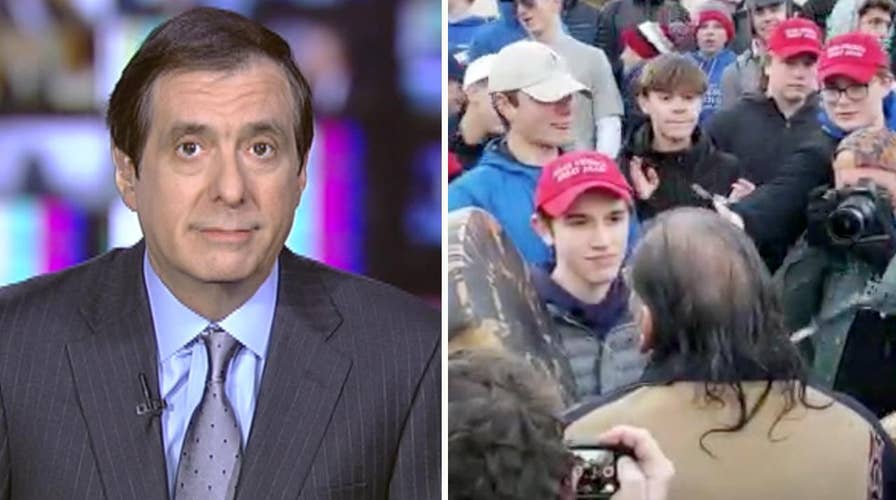Covington students, journalists mired in Twitter's toxic stew
Howard Kurtz: When online mobs attack unknown kids, we've got a problem
'MediaBuzz' host Howard Kurtz weighs in on the mob mentality within the mainstream media when they went after the Covington Catholic High School students.
With the president now using the Covington controversy to call some media coverage "evil," we are in a full-blown hand-wringing session about journalism, social media, religion and the dangers of overreacting to a viral video.
But take a step back (if that's indeed possible these days) and ponder the toxic online culture in which warring tribes go for the jugular at a moment's notice.
For all the benefits of lightning-quick networks like Twitter, it's become a place where reputations are ruined, hatred is incited and threats are hurled with abandon.
There are no rules or rights of appeal in the court of social media.
In the case of the Covington Catholic High School students from Kentucky, who were in Washington for the Right to Life march, numerous journalists have apologized for their rush to judgment, for acting like a "complete dolt," as The New York Times' Kara Swisher put it. Add National Review to the list: "We apologize to our readers and especially to the Covington students, who didn't need us piling on."
But even though the narrative has turned, with additional video making clear that Nick Sandmann and the students were not the aggressors in a clash with Native American activists, the damage has been done. Their high school was closed yesterday for security reasons.
Media organizations acted as a giant megaphone for the accusations being concocted and spewed online.
The president's interest was obviously piqued because some of the Catholic students were wearing red MAGA hats.
"Nick Sandmann and the students of Covington have become symbols of Fake News and how evil it can be," he tweeted. "They have captivated the attention of the world, and I know they will use it for the good - maybe even to bring people together. It started off unpleasant, but can end in a dream!"
It's hardly surprising that Trump would use the episode to bash the press; even the press is bashing the press over this one. He also tweeted yesterday that he pulled the plug on most of the White House briefings:
"The reason Sarah Sanders does not go to the 'podium' much anymore is that the press covers her so rudely & inaccurately, in particular certain members of the press. I told her not to bother, the word gets out anyway!"
(I have accepted Sanders' explanation, to me and others, that her boss talks to reporters so frequently that fewer briefings are needed. But now that they've become such a rarity, I think it's a loss, especially for journalists from smaller and regional outlets. And Sanders is tough enough to deal with aggressive or even unfair questioners.)
TRUMP DEFENDS COVINGTON STUDENTS, CALLS MEDIA COVERAGE 'EVIL'
The president, with 57 million followers, is a master tweeter, though he's drawn his share of criticism for insulting opponents and media types by name. But what's happened with the Covington students, whose parents were also denounced online, is a whole different level of abuse.
David Brooks, the New York Times columnist, sort of lets journalists off the hook by saying that “these days the social media tail wags the mainstream media dog. If you want your story to be well placed and if you want to be professionally rewarded, you have to generate page views — you have to incite social media. The way to do that is to reinforce the prejudices of your readers."
That’s true, but still rather depressing.
Brooks says that at first, the left had the upper hand: "In this one episode, you had a gentle, 64-year-old Native American man being swarmed by white (boo!), male (boo!), preppy (double boo!) Trump supporters (infinite boo!). If you are trying to rub the pleasure centers of a liberal audience, this is truly a story too good to check."
But after the emergence of more information, there was "a day of conservative vindication. See? This is what those liberals do! They rush to judgment, dehumanize and seek to expunge us from national life. The main boy wrote a public letter that was consistent with the visual evidence and that was actually quite humane."
The bottom line: "The crucial thing is that the nation's culture is now enmeshed in a new technology that we don't yet know how to control. In this technology, stereotype is more salient than persons. In this technology, a single moment is more important than a life story. In this technology, a main activity is proving to the world that your type is morally superior to the other type."
And, that, folks, is a formula for endless tribal warfare.
Look, we're never going to end this sort of thing as long as people have access to keyboards. But it's one thing for the president, lawmakers and journalists — people in the arena — to go at it online. It's another for an 11th-grader that no one has ever heard of to become the target of a global vilification campaign.
CLICK HERE TO GET THE FOX NEWS APP
Almost all of us have rushed to judgment at one time or another. But it's time for those of us with public followings to exercise some restraint. Don't hop on the outrage bandwagon until more information becomes available. The world will survive without your instantaneous take.
I used to say the hardest thing in journalism was for a reporter not to write a story after investing plenty of time but coming up short on the facts. Now it's restraining the itchy Twitter finger that, when combined with thousands or millions of others, can do so much damage.





















